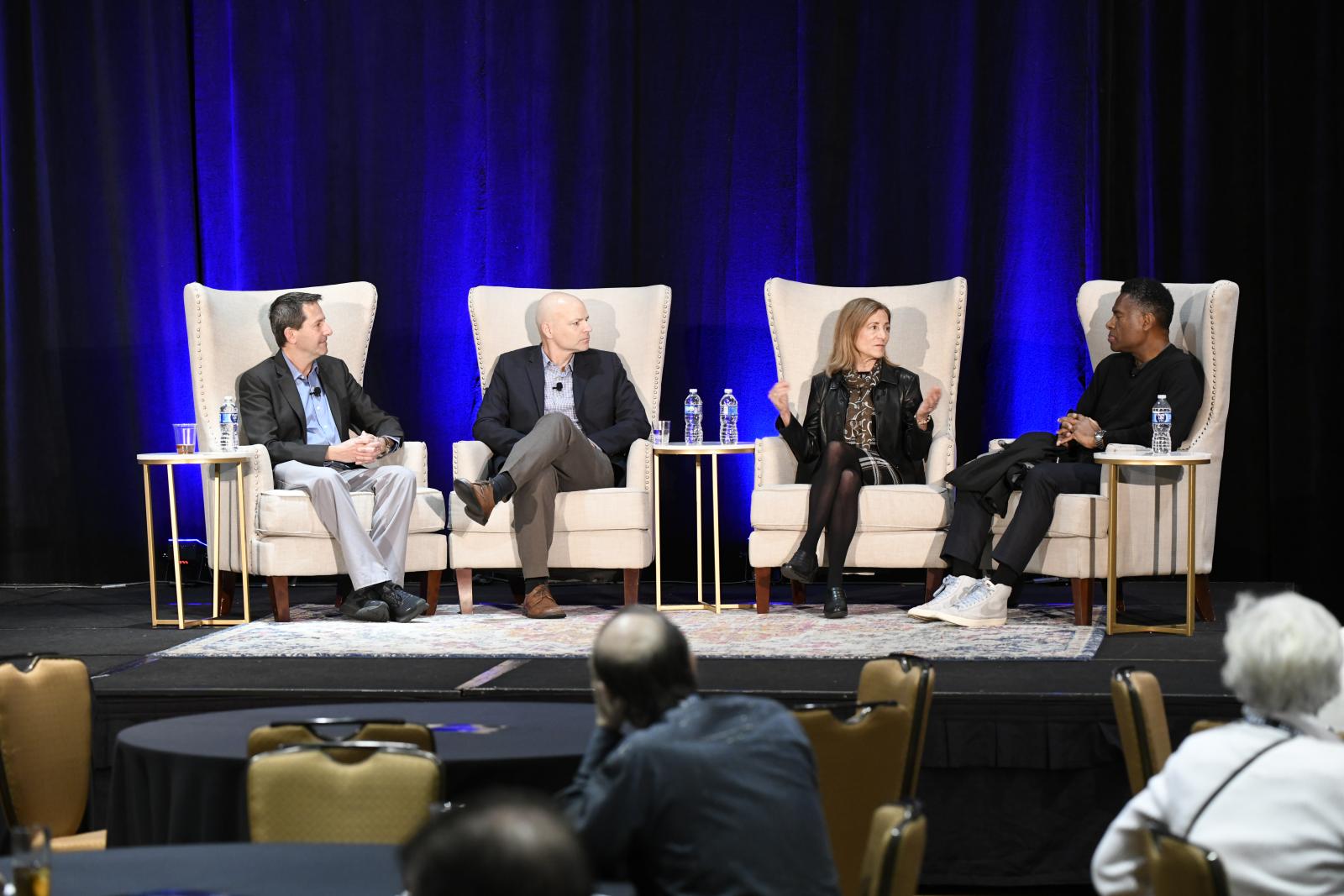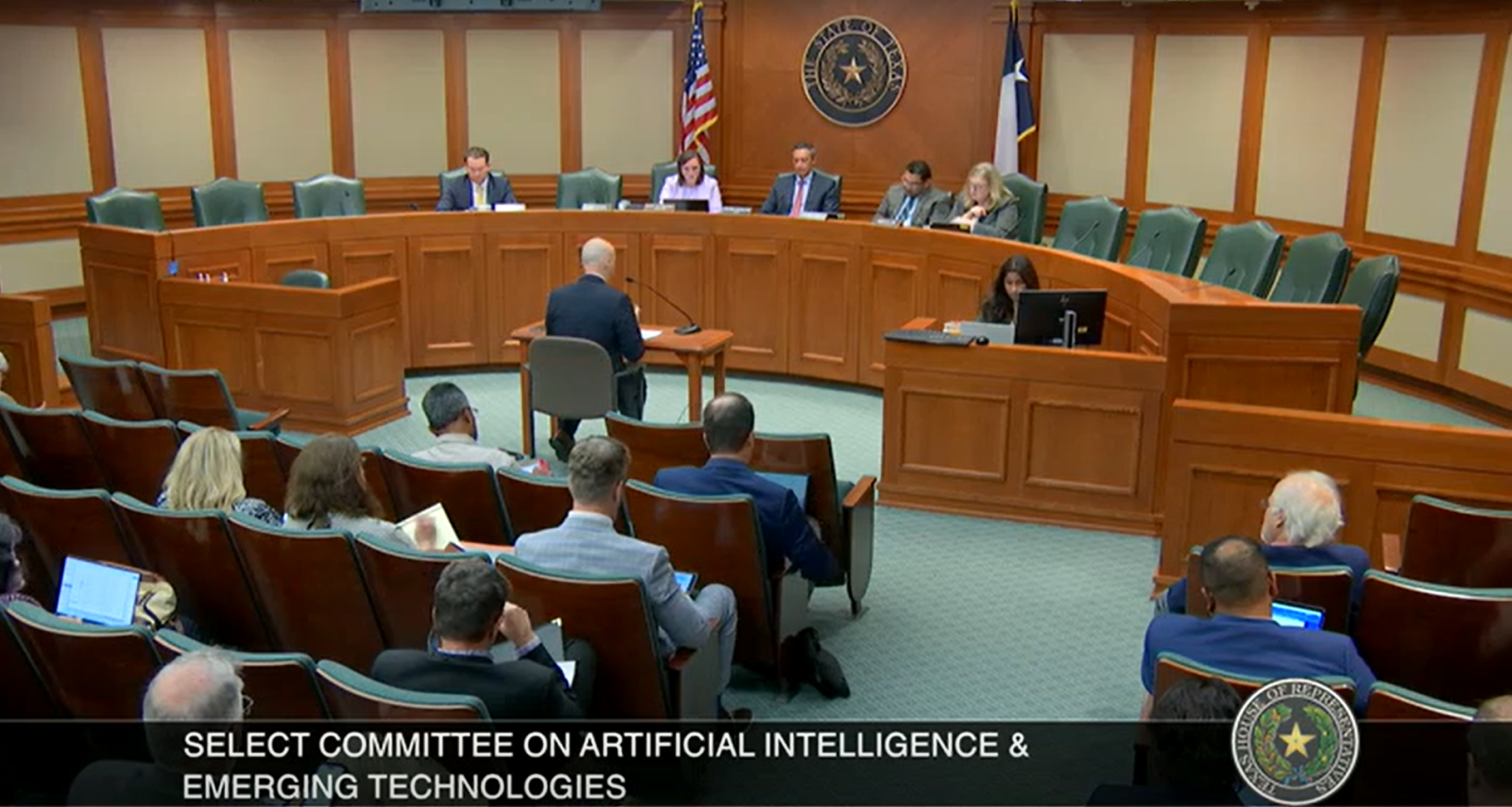How Researchers Are Informing AI Policy, Locally and Nationwide

As artificial intelligence reshapes society, The University’s Good Systems grand challenge is emerging as a valuable resource for policymakers and national security advisors grappling with AI's ethical implications. The interdisciplinary team of researchers has been engaging with government officials at various levels to help inform public policy on AI and participate in dialogue about emerging technologies.
From local initiatives to state legislative hearings to a visit with the Department of Defense, Good Systems researchers have participated in a growing number of high-level discussions throughout 2024. This uptick in engagement reflects both the urgency of AI governance issues and the group's efforts to translate their research into best practices guidance.
ATX Ponders AI
Locally, UT researchers have been instrumental in guiding the City of Austin's approach to AI governance. Professors Sherri Greenberg and Sharon Strover, current and former chairs, respectively, of the Good Systems Executive Team, worked with City Council Member Vanessa Fuentes to inform a resolution establishing standards for the city's use of AI technologies.
Amelia Casas, communications & policy advisor to Councilmember Fuentes, explained the motivation behind their initiative. "We know it's coming,” she said of the wave of AI technologies approaching the shore. “We've seen it across the board, and we know that technology continues to advance every day. Councilmember Fuentes really wanted to come at this as an opportunity to get ahead of the problem as a city: to protect the privacy and data of our constituents and residents here in Austin, but also take care of our workforce."
The councilmember's office sought expertise from the community and academia, connecting Strover with Steven Apodaca, the chairman of the Community Technology & Telecommunications Commission. Strover, who also co-directs the Technology and Information Policy Institute at the Moody College of Communication, provided insights on smart technologies implementation and surveillance research.
"Right off the bat, she was really adamant that we needed an advisory committee to provide oversight and community input," Casas said. "She also was a proponent of how necessary it was to have transparency as part of this policy."
"We recognize that cities all over our country and the world are rushing into using these technologies, but there's not a whole lot of attention being paid to evaluating the outcomes and to framing the ethical and moral choices that might be involved in going this route or that route."
— Sharon Strover, Good Systems Executive Team
Strover emphasized the urgency of addressing AI governance at the municipal level. "We recognize that cities all over our country and really all over the world are rushing into using these technologies," she said. "There is a cottage industry promoting the uses of both data gathering and data analytic applications, but there's not a whole lot of attention being paid to evaluating the outcomes and to framing the ethical and moral choices that might be involved in going this route or that route."
Strover's research has revealed a significant gap in public awareness about AI use in city operations. "One thing we found very quickly was that most people have no idea what the City is doing," she said. "They don't know that so many units use drones and capture a lot of visual data using drone cameras — from EMS to the utility company to the fire department."
The resulting resolution, which passed unanimously in February, calls for ethical guidelines, transparency measures and regular audits of AI technologies. It directs the city manager to develop a comprehensive plan for workforce training and ensures that AI supplements rather than replaces human workers. An advisory committee, including Greenberg, will provide ongoing guidance on AI implementation.
Greenberg also informed the councilmember's office about UT Austin President Jay Hartzell's declaration of 2024 as the "Year of AI" and expressed hope for continued collaboration between the City and Good Systems. "We look to our experts in the community, as well as within education,” Casas said. “Their teams are really looking at the mix of surveillance and smart technologies."

House Calls on Lease Expertise
In April, Matthew Lease, professor in the School of Information, provided expert testimony to open the first meeting of the Texas House Committee on AI & Emerging Technologies. Lease, who leads Good Systems’ "Designing Responsible AI Technologies to Protect Information Integrity" project, offered legislators a comprehensive overview of the current state of AI technology and its potential impacts.
The newly formed committee was tasked with conducting a comprehensive review of advancements in AI and emerging technologies, examining their economic, ethical and societal implications. Their mandate includes exploring the current state of AI, determining its impact on various sectors, identifying policy considerations for responsible deployment and formulating recommendations for legislative and regulatory actions.
"It was an honor to contribute to this important dialogue at the state level. As AI becomes increasingly integrated into our daily lives, it's crucial that policymakers understand both its capabilities and the associated risks."
— Matthew Lease, School of Information
In his testimony, Lease provided several key recommendations to guide the committee's work, in areas ranging from transparency and data provenance to bias and fairness and cross-sector collaboration. "It was an honor to contribute to this important dialogue at the state level," Lease said. "As AI becomes increasingly integrated into our daily lives, it's crucial that policymakers understand both its capabilities and the associated risks."
The committee's report, released following the hearing, incorporated several of Lease's key recommendations, setting the stage for future policy discussions and potential legislation in Texas. These included implementing transparency requirements for AI models to disclose their training data sources, emphasizing the importance of high-quality data to avoid biases, and encouraging “human-in-the-loop" systems to ensure human oversight in critical decision-making processes. The report also highlighted Lease's suggestions for developing educational programs to prepare the workforce for an AI-driven economy and establishing comprehensive regulatory frameworks to address the ethical, legal and social implications of AI.
Caucus Meets Campus
It's not just the Texas House that has looked UT’s way for guidance. Spencer Schumacher, executive director of the legislature’s Innovation & Technology Caucus — a bicameral, bipartisan coalition of legislators, which, with 65 members, is now the largest bipartisan caucus in the Texas legislature — has been collaborating with Good Systems experts to shape the state's approach to AI regulation.
Schumacher, who reports to the IT Caucus chair, Representative Giovanni Capriglione, emphasized the crucial role of academic perspectives in balancing industry interests and consumer protection. “It's extremely helpful to have that academic perspective, because... industry is always going to be biased towards industry, and consumer groups are always going to be biased towards consumers, but academic professionals are biased towards the truth,” he said. “They’re biased towards what they think is going to be good policy. So having them to guide us along in terms of where the scholarship is, what the latest research is, is extraordinarily useful.”
“It's extremely helpful to have that academic perspective because academic professionals are biased towards the truth. They’re biased towards what they think is going to be good policy.”
— Spencer Schumacher, Innovation & Technology Caucus
To gather these perspectives, Schumacher solicited input from Greenberg, as well as Good Systems founding chair Kenneth Fleischmann. Their insights were helpful in striking a balance between innovation and regulation in shaping a comprehensive AI regulatory scheme. Schumacher says "Good Systems has been useful for us" in countering the industry-tilted balance often seen in these discussions. "I think sometimes people think that these bills are hammered out in smoke-filled rooms,” he added. “Really they're hammered out in large auditoriums where there are 300 people and it's open to the public."
Greenberg and Fleischmann also represented Good Systems at the IT Caucus's first-ever AI Day at the Capitol, further bridging the gap between academic expertise and legislative action. All of this collaboration comes as Texas implements the Texas Data Privacy and Security Act, which went into effect July 1. Combined with insights from UT Austin researchers, this legislation is shaping a comprehensive approach to AI governance in the state.
National Security and the Pentagon
University researchers’ influence on dialogue about AI technologies extended beyond the Lone Star State’s borders into national security. In March, three Good Systems leaders were among the eight academics invited to the Pentagon to visit Department of Defense (DOD) leadership and science and technology advisors. Professor Lease, along with Luis Sentis from aerospace engineering and Peter Stone from computer science, met with Admiral Christopher W. Grady, vice chairman of the Joint Chiefs of Staff, as part of a pilot program to enhance Joint Staff engagement with academic research partners.
"It was a once-in-a-lifetime opportunity to discuss the importance of AI research and innovation with Admiral Grady," Lease said. “The DOD is always looking far ahead, considering what future national defense needs might look like and what our warfighters will need to effectively safeguard our country."

The meeting, organized by UT’s Defense Research Advancement, touched on the potential applications of AI in national defense and the ethical considerations that must guide its development and deployment. Lease's expertise in information integrity proved particularly relevant. "The information environment and its national security implications are a priority shared by our organizations," Lease said. "These discussions are helpful in shaping our research."
Shaping AI for Congress at the Capitol
Building on this momentum, in April, UT President Jay Hartzell met with members of Texas's congressional delegation in Washington, D.C. Accompanied by Good Systems’ S. Craig Watkins (executive director of the IC2 Institute) and Samantha Shorey (communication studies), Hartzell advocated for increased federal support of public AI research and workforce initiatives.
During the visit, Hartzell emphasized the crucial role of public universities in advancing AI research and development. He urged lawmakers to support legislation that would bolster funding for AI research, enhance partnerships between academia and industry and address the growing demand for AI-skilled workforce.
Such high-level engagements underscore the growing recognition of UT Austin's expertise in AI research and ethics. They also reflect the increasing importance of academic partnerships with government and military institutions in addressing the challenges posed by rapidly advancing AI technologies.
Looking Ahead
Earlier this summer, Good Systems was added to the National Institute of Standards and Technology’s (NIST) Artificial Intelligence Safety Institute Consortium (AISIC), alongside the Cantellus Group, marking the newest chapter in the grand challenge’s efforts to influence federal AI policy. This partnership enables the team's researchers to further contribute to the development of federal AI policies and standards.
As they continue their work, Good Systems remains focused on navigating the complexities of AI policy and regulation with a commitment to ensuring that AI technologies are deployed safely and ethically — in Austin, in Texas, nationwide and, perhaps someday, the world.

